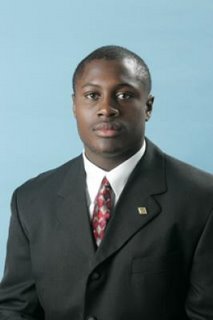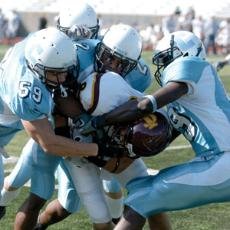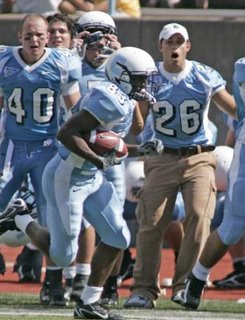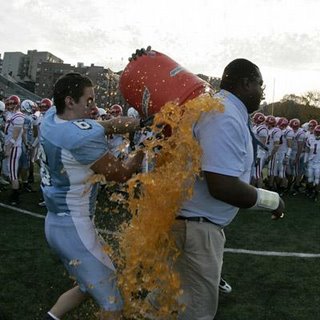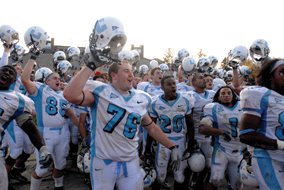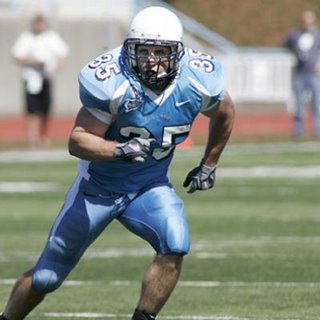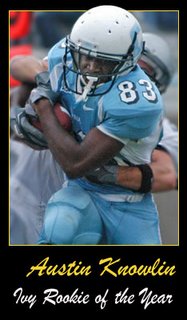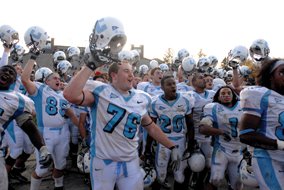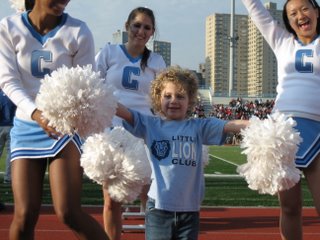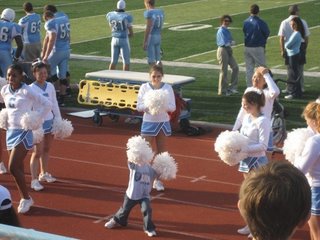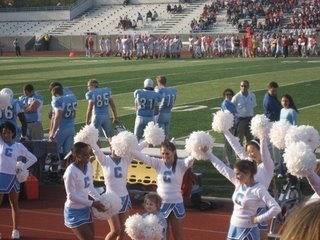Rare Pick
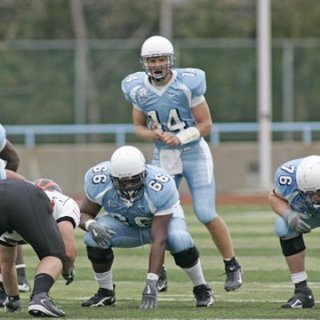
This is a first in a series of posts focusing on the individual seasons of Columbia's key football players in 2006
I've already written a lot about how Columbia QB Craig Hormann turned his season around in the final three games, but there was one consistent strength he showed throughout 2006 that must have played a big role in his choice by the Ivy League coaches as second team All Ivy. Craig Hormann is flat out the toughest QB to pick off in the Ivies. He played in 39 of the 40 total quarters for CU, threw 329 passes, and only six of them were intercepted. That's just one pick per 54 passes thrown.
That was far and away, the best rate among Ivy QB's. Here's the total list:
Name: Interception Rate
1. Craig Hormann (Columbia): 1 in every 54 passes
2. Matt Polhemus (Yale): 1 in every 35 passes
3. Jeff Terrell (Princeton): 1 in every 30 passes
4. Chris Pizzotti (Harvard): 1 in every 28 passes
5T. Mike Fritz (Dartmouth): 1 in every 26 passes
5T. Robert Irvin (Penn): 1 in every 26 passes
7T. Nate Ford (Cornell): 1 in every 22 passes
7T. Liam O'Hagan (Harvard): 1 in every 22 passes
9. Joe DiGiacomo (Brown): 1 in every 21 passes
So in other words, Craig Hormann was 54% less likely to throw an interception than the next best Ivy QB in this category. It's just amazing to have a quarterback who is that unlikely to get picked off. But also remember that Columbia ran the ball less frequently and less effectively than any team in the league, and opposing defenses pretty much looked for the pass on almost every play. And one of Hormann's interceptions was off a Hail Mary job at the end of the half at Yale.
Being a frequently-throwing QB and avoiding the regular INT is a rarity at every level of football. Some QB's overcome their interception-throwing tendencies over time, but even the greats have trouble with this, ask Brett Favre who throws an interception for every 30 attempts, Roger Staubach who tossed an INT once every 27 throws, and Joe Namath threw a pick for every 17 passes. Interestingly, Joe Montana, Steve Young and Tom Brady all have a 1 in 38 interception-to-pass ratio.
This is the stat Craig Hormann can be most proud of by far. And if he is able to maintain anything close to his 1 in 54 ratio next season, he would have to go down as one of the most sure-handed passers in almost all of organized football history.
The flip side to all of this is Hormann only threw seven TD passes. But Columbia only scored 11 offensive touchdowns all season, so when the Lions offense was effective, Hormann was usually a very big reason why. So, while throwing only seven TD passes in a 10 game season is nothing to write home about, in Hormann's case it is not a badge of shame either.
Another problem with all of this is Hormann's low interception rate probably has something to do with the small number of long passes he attempted in 2006. Going for the bomb often leads to picks and throwing short is usually a safer way to go. In 2005, Hormann threw eight interceptions on 260 passes for a very respectable 1 in 33 ratio. But one reason his numbers weren't as impressive in 2005 is because Hormann threw the ball deep much more often. His deep threat that season was Brandon Bowser, who graduated last May. As much as I'd like to see Hormann repeat the 1 in 54 ratio this coming season, I don't want it to be the result of Columbia not having a legitimate deep threat. Austin Knowlin can catch passes for big gainers, but he seems like more of a catch and run type than the guy who grabs the ball on the fly 50 yards beyond the line of scrimmage. The other probable starting wide receiver in 2007 is Taylor Joseph, who also does not look like a classic deep threat.
That's where Tim Paulin comes in. Paulin has good speed and the body type to be a classic target for the deep ball. He'll need to work hard in the off season and focus on holding on to the ball, (he dropped a sure TD pass at Harvard and lost a costly fumble in the Georgetown game), but he could add a very important dimension to the Lion offense in 2007.
YPA Improvement
Despite not having a real deep threat target in 2006, Hormann improved in what I think is one of the most important stats in all of football: yards per pass attempt. Generally, a YPA of seven yards or better is considered the gold standard at any level. Guys like Joe Montana (7.5 career YPA), Dan Marino (7.3 career YPA), and Peyton Manning (7.7 career YPA), all sport super YPA numbers. In 2005, Hormann's YPA was 5.7 and this year it improved nicely to 6.1. He'll need to get that closer to 6.5 or better to jump-start the Lion offense in 2007.
Here are the 2006 Ivy League YPA Standings
1T. Chris Pizzotti (Harvard): 7.4
1T. Jeff Terrell (Princeton): 7.4
3. Joe DiGiacomo (Brown): 7.3
4T. Mike Fritz (Dartmouth) 7.0
4T. Nate Ford (Cornell): 7.0
6. Matt Polhemus (Yale): 6.9
7. Robert Irvin (Penn): 6.8
8. Liam O'Hagan (Harvard): 6.3
9. Craig Hormann (Columbia): 6.1
As you can see, Hormann was dead last in this crucial statistic this season and that can't continue.
Forget the Stats... Tell Me about His Heart!
Okay, I'm a stat-lover. But the stats don't show something very important about the maturation of Craig Hormann over the course of the 2006 season. More important than even his low interception numbers was Hormann's new-found ability to march his team down the field at crucial times. Sadly, this skill didn't show up on the field consistently until the final three weeks of the season, but it did make its appearance and now Hormann has something to build on.
There was one flash of leadership brilliance early on. In week two, after Georgetown cut Columbia's 20-0 lead to 20-14 late in the 4th quarter, Hormann led the Lions on a high-pressure drive that ended in the game-clinching field goal.
Against Harvard in week 7, Hormann led the team down the field several times, but two fumbles by Hormann himself and two more from Jamal Russell and Austin Knowlin killed any chance of a comeback in that 24-7 loss.
Against Cornell, Columbia's only long drive was the opening possession, when Hormann marched the Lions 77 yards down the field for an opening touchdown. But I thought the quick one-play 33-yard drive, (Hormann found Russell for a TD), after Tad Crawford's key interception in the third quarter was a great sign of the "take it to them now!" kind of leadership.
But nothing really prepared anyone for the gutsy leadership Hormann exhibited in the final game against Brown. Two drives defined that performance for the junior Lion QB. After Brown took a 21-12 lead with a TD late in the third quarter, Hormann led the team right down the field for an 11-play 80-yard TD drive. And then on the next possession he engineered a 63-yard drive that ended with the winning 27-yard field goal. He'll need to repeat that kind of grace under pressure as much as possible in 2007.
I thought Hormann also showed a lot of physical strength and stamina throughout the season. He only took 15 sacks, but was hit hard in game after game. He limped off the field after one series against Harvard, but came right back on the next possession. He also showed no ill mental effects after he was briefly benched for M.A. Olawale in the fourth quarter in the Dartmouth game. On a Columbia team that's been plagued by a few too many guys quitting the team over the years, Hormann is a good example of perseverance.
Get Some Legs
Craig Hormann doesn't need to become a scrambling quarterback who runs for 50-80 yards a game to have a strong season next year. But he will have to tuck the ball and run with it at least twice a game or so to keep opposing defenses honest. And he also needs to learn how to run that little QB sneak into the line of blockers a lot better. There were too many times in 2005 and 2006 when Hormann couldn't get that yard on 3rd and one or 4th and one plays.
But all of this is based on the idea that Columbia's running game will be just as bad, or only slightly better than it was in 2006. If the running game improves to a serious degree, there's really no telling how effective Hormann can be. But it will be a lot of fun to find out.









